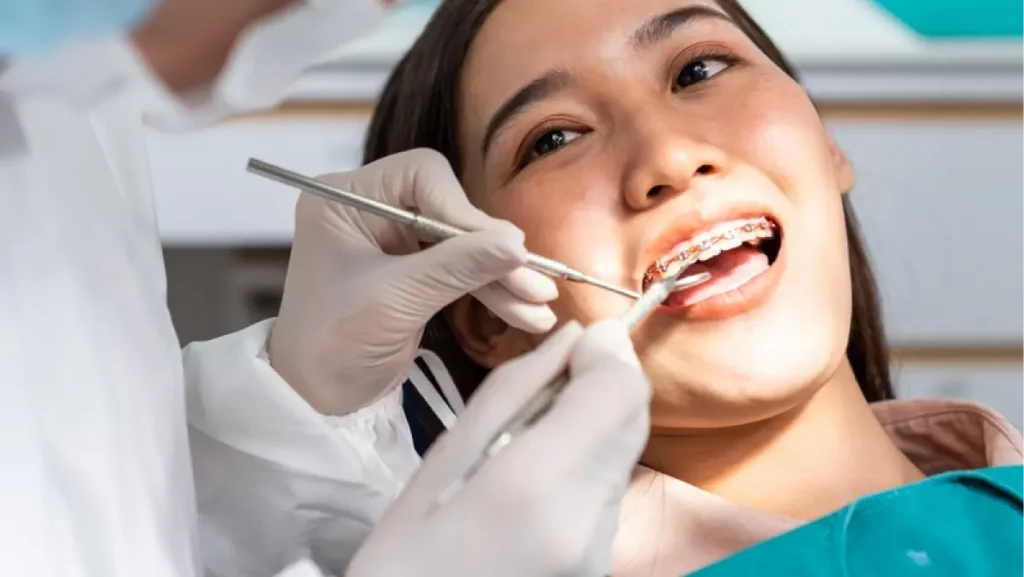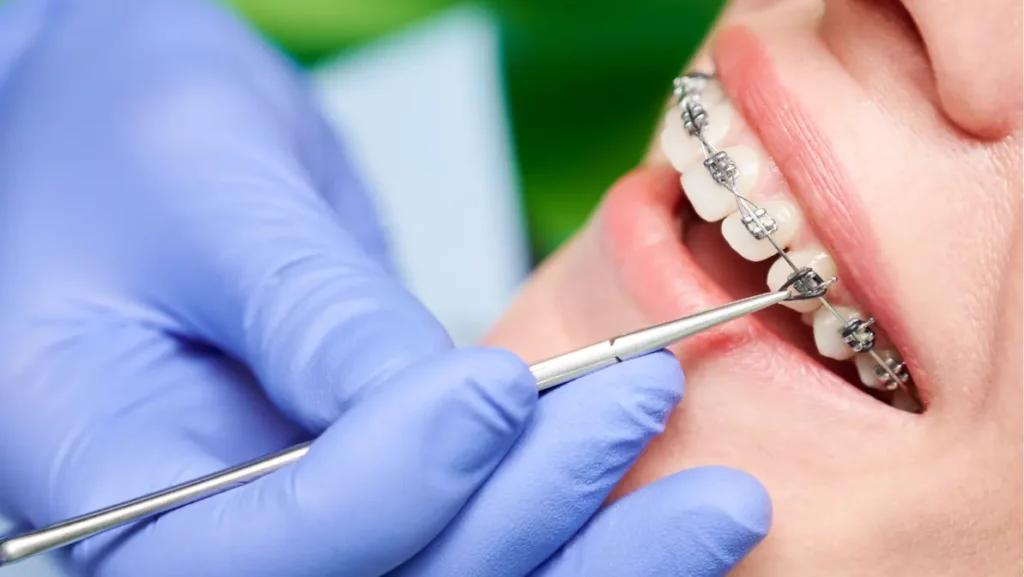Braces are a major step toward achieving a beautiful, healthy smile. But before committing to orthodontic treatment, it’s important to understand the process, costs, and expected results.
If you’re looking to correct misaligned teeth or improve your bite, it’s important to be informed about your treatment options. What to know before getting braces includes understanding your treatment options, the timeline, and how braces may impact your daily routine. In this guide, we’ll explore what to ask your orthodontist before getting braces to ensure you make the best decision for your dental health.
Why Asking Questions Before Getting Braces Is Essential

Orthodontic consultation questions are crucial because orthodontic treatment is a long-term commitment that requires proper planning. Asking your orthodontist the right questions will help you understand what to expect, prepare for potential challenges, and ensure you receive the best care. Additionally, if you have existing dental work, it’s important to discuss how braces may impact your dental restorations.
Understanding Your Treatment Options
Before getting braces, it’s crucial to explore different options and determine the best approach for your unique needs.
What types of braces are available?
Orthodontic technology has advanced significantly, offering multiple types of braces, including:
- Traditional Metal Braces: The most common option, known for durability and effectiveness.
- Ceramic Braces: Less visible than metal braces but require more care.
- Lingual Braces: Placed behind the teeth for a discreet appearance.
- Clear Aligners (e.g., Invisalign): Removable, nearly invisible trays for mild to moderate cases.
Which option is best for my dental condition?
Your orthodontist will assess your teeth and bite to recommend the best treatment. Factors such as crowding, spacing, and jaw alignment play a role in selecting the right type of braces.
How long will my treatment take?
Treatment duration varies depending on the severity of misalignment. On average:
- Mild cases: 6-12 months
- Moderate cases: 12-24 months
- Severe cases: 24-36 months
Costs and Insurance Coverage
Braces can be a significant financial investment, so it’s essential to understand the costs and payment options available.
How much do braces cost? (Price range for different types)
The cost of braces varies based on the type and complexity of treatment:
- Metal Braces: $3,000 – $7,000
- Ceramic Braces: $4,000 – $8,000
- Lingual Braces: $8,000 – $10,000
- Clear Aligners: $3,000 – $7,500
Does my insurance cover orthodontic treatment?
Many dental insurance plans offer partial coverage for braces, especially for children. However, adult orthodontic coverage may be limited. Check with your provider for details.
Are there flexible payment plans or financing options?
Most orthodontists offer payment plans to make treatment more affordable. Options may include:
- Monthly installments
- Interest-free financing
- Health savings accounts (HSA) or flexible spending accounts (FSA) coverage
Comfort and Maintenance

Taking proper care of your braces will keep your treatment on track and help minimize discomfort and prevent damage.
Will braces be painful?
Braces can cause mild discomfort, especially after adjustments. Pain relievers, orthodontic wax, and soft foods can help ease the initial soreness. The discomfort usually subsides within a few days after each adjustment as your mouth adapts to the changes.
What foods should I avoid while wearing braces?
Certain foods can damage braces by loosening brackets or bending wires, leading to prolonged treatment. To keep your braces in good condition, avoid:
- Sticky foods: caramel, gum, taffy, and gummy candies
- Hard foods: nuts, popcorn, ice, and hard candy
- Chewy foods: bagels, tough meats, and thick bread crusts
- Sugary foods: excessive candy, soda, and sweets that can increase plaque buildup around brackets
How should I clean and take care of my braces?
Proper oral hygiene is crucial:
- Brush after every meal with a soft-bristle toothbrush
- Use interdental brushes or water flossers
- Rinse with fluoride mouthwash
Treatment Process and Adjustments

Regular checkups and adjustments ensure your braces are working effectively and your teeth are shifting as planned. Your orthodontist will monitor your progress and make necessary changes to keep your treatment on track.
How often will I need to visit for adjustments?
Most patients visit their orthodontist every 4-6 weeks for adjustments. These visits help:
- Tighten or replace wires to maintain consistent pressure on your teeth.
- Address any discomfort or minor issues, such as loose brackets or shifting teeth.
- Ensure your treatment is progressing as expected and make modifications if needed.
What happens if a bracket or wire breaks?
Accidents happen, and broken brackets or wires should be addressed promptly. If this occurs:
- Schedule an appointment with your orthodontist as soon as possible.
- Use orthodontic wax to cover any sharp edges to prevent irritation.
- Avoid hard, sticky, or chewy foods that could worsen the damage.
- Do not try to fix it yourself, as this could delay your treatment or cause further issues.
What are the common side effects of wearing braces?
Adjusting to braces takes time, and some temporary side effects may occur:
- Mild Discomfort: Soreness is common after adjustments but usually subsides in a few days. Over-the-counter pain relievers can help.
- Speech Changes: Some people experience a slight lisp initially, but this improves as you get used to your braces.
- Gum and Cheek Irritation: The brackets and wires may rub against the inside of your mouth. Orthodontic wax can help protect sensitive areas.
Expected Results and Retention Plan
Achieving a straight smile is just the beginning—maintaining results is equally important.
How will braces improve my smile and bite?
Braces do more than straighten teeth—they enhance oral health and function:
- Correct Bite Alignment: Fixes overbites, underbites, and crossbites, reducing jaw strain and TMJ issues.
- Prevent Tooth Decay & Gum Disease: Straight teeth are easier to clean, lowering the risk of cavities and gum problems.
- Improve Chewing & Speech: Proper alignment enhances chewing efficiency and prevents excessive tooth wear.
- Boost Confidence: A straighter smile can improve self-esteem in social and professional settings.
Will I need a retainer after braces?
Yes, retainers help maintain your new smile. Without them, teeth may shift back over time.
- Fixed Retainers: A thin wire bonded behind the teeth for continuous support.
- Removable Retainers: Worn at night; available as Hawley (wire & acrylic) or clear plastic trays.
What happens if my teeth shift after treatment?
Some movement is natural. If noticeable shifting occurs:
- Wear your retainer more frequently.
- Get a new or adjusted retainer.
- Minor orthodontic adjustments, like clear aligners, may be needed for significant shifts.
Achieving Your Best Smile: Partnering with the Right Orthodontist
Choosing to get braces is a significant decision, and braces consultation tips can help ensure you receive the best treatment for your needs. Preparing for braces means understanding costs, maintenance, and expected results, which helps set realistic expectations.
For those seeking expert cosmetic dental care, Dr. Saif Shere, a renowned celebrity cosmetic dentist specializing in veneers and cosmetic dentistry in Houston, TX, offers comprehensive solutions tailored to your needs. Whether you’re enhancing your smile with braces or exploring other dental treatments, expert guidance is key to achieving optimal oral health. Contact Dr. Saif Shere today!